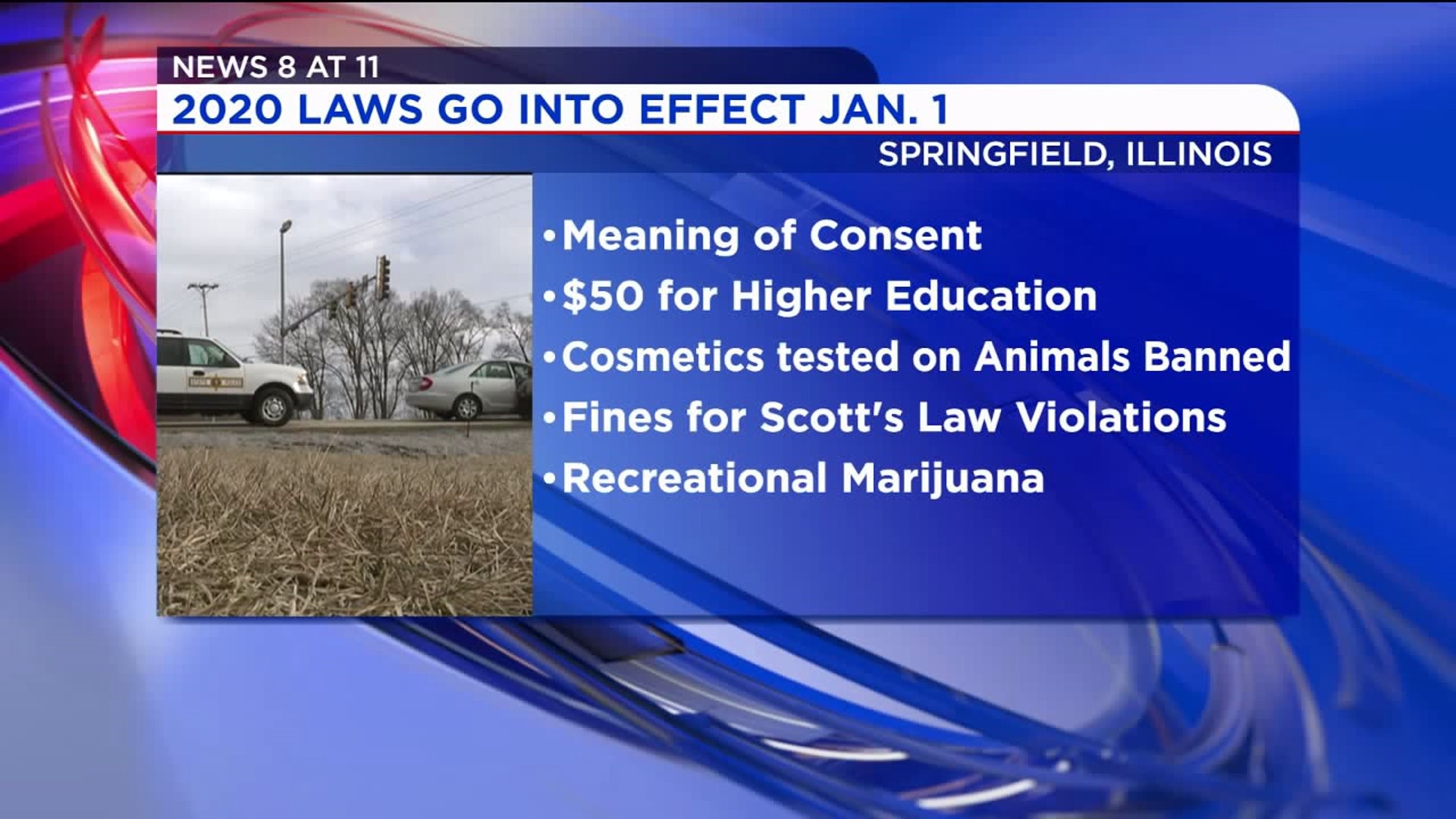SPRINGFIELD, Illinois- With the new year comes new laws, and Gov. Pritzker had his signing hand busy for most of 2019. Everyone knows weed will be legal come January 1, but what else is changing?
In Illinois, more than 250 new laws take effect in January that will affect nearly all Illinoisans.
Recreational Marijuana: Effective January 1, 2020.
The text of the law states that "In the interest of allowing law enforcement to focus on violent and property crimes, generating revenue for education, substance abuse prevention, and treatment, freeing public resources to invest in communities and other public purposes, and individual freedom, the General Assembly finds and declares that the use of cannabis should be legal for persons 21 years of age or older and should be taxed in a manner similar to alcohol."
Anyone under the age of 21 still can not legally use marijuana.
Illinois minimum wage increases: The law states the wage shall increase by $1 to 9.25 on January 1. Followed by a 75-cent increase to $10 on July 1. Ultimately the increase will be $15 per hour by 2025.
Employers will see two hikes in 2020. Tipped workers can still be paid 60% of the regular minimum wage. The new law also includes a payroll deduction tax credit for employers of 50 or fewer workers.
Wage History Question Prohibition: Amends the Equal Pay Act of 2003 prohibiting an employer from:
- Screening job applicants based on their wage or salary history,
- Requiring that an applicant’s prior wages satisfy minimum or maximum criteria,
- Requesting or requiring that an applicant disclose prior wages or salary as a condition of being interviewed or as a condition of continuing to be considered for an offer of employment.
- The law prohibits an employer from seeking the salary, including benefits or other compensation or salary history, of a job applicant from any current or former employer, with some exceptions.
- Potential employees may freely provide past salary information, but employers must not ask for it.
Employers who do not comply could face fines and penalties from the Illinois Department of Labor and well as potential civil action and lawsuits.
Illinois discrimination law expands: Employers have to train workers yearly on preventing sexual harassment.
Employment Discrimination/Sexual Harassment (effective Jan. 1, 2020)
This major expansion of Illinois’ employment discrimination law covers a variety of issues that all employers must be aware of and adhere to. In summary:
- Requires employers to train workers annually on preventing sexual harassment in the workplace. The Illinois Department of Human Rights is required to make a training program free on-line to employers to provide to workers. Current or alternative training that an employer provides is acceptable if it meets the minimum criteria required of the training There are additional training requirements for bars and restaurants.
- Expands the Victims Economic Security and Safety Act (VESSA) to allow victims of gender violence to take unpaid leave from work for medical, legal, counseling or safety assistance.
- Makes harassment against contract workers/employees illegal (they were not covered in the past).
- Prevents a union representative from representing both a victim of sexual harassment and the alleged harasser in a disciplinary meeting.
- Clarifies that it is illegal to discriminate against as employee if they are perceived to be part of a protected class (e.g.: gender, sexual orientation, ethnicity) even if they are not.
- Limits the use of employee non-disclosure agreements, arbitration clauses, and non-disparagement clauses in relation to sexual harassment, discrimination, and retaliation.
- Creates the Hotel and Casino Employee Safety Act, requiring such employers to adopt anti-sexual harassment policies and make safety devices available to employees.
- Requires employers to report charges filed against it by Illinois employees for employment discrimination and sexual harassment.
- Pet cats have to get rabies inoculations. Feral cats are exempt.
- The statute of limitations will be eliminated for criminal sexual assault, aggravated criminal sexual assault or aggravated criminal sexual abuse, regardless of the age of the victim. The statute of limitations is also lifted for the prosecution of female genital mutilation.
- Another new law allows minors 12 and older to get preventative STD treatments such as HIV PrEP medications without parental consent. ID cards for minors will cost $5, not $10. If your child is a paid performer, a new law requires at least 15 percent of gross earnings be deposited into a trust fund they can access when they turn 18.
- A new law also starts the process of the Illinois treasurer creating the Illinois Higher Education Savings Program, which will use tax dollars to provide a $50 college-savings fund for each baby born in the state, though newborns won’t be enrolled until January 2021
- Sexual education classes will be required to teach the meaning of consent.
- Schools could begin teaching about workplace sexual harassment and discrimination in the high school curriculum.
- It will be illegal to watch or stream videos while driving.
- Passing a stopped school bus could get you a $300 fine for the first offense and $1,000 for the second offense. There are also increased fines and penalties for violating Scott’s Law.
- The Secretary of State will have to inform people about the zipper merge method and also include at least one question about Scott’s Law on driver tests.
- Vehicles with smoked or tinted lighting lens covers are now illegal.
- Some farm wagon trailers and other qualified equipment won’t have to have license plates beginning New Year’s Day.
- Employers can’t inquire into or use an arrest record as a basis for an employment decision. Arrest records also can’t be used to refuse to engage in real estate transactions.

